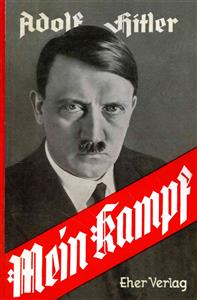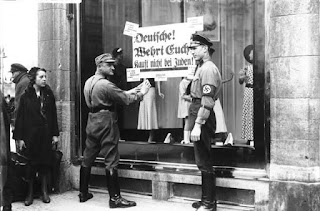History 101:
Was the Final solution inevitable? Part 1
Probably the first main set of laws and official policies were the Nuremburg laws of 1935. These inhumane set of laws set out Germany on a path that would clearly plunge the Jewish community into chaos. Marriage was banned between non-Jews and Jews and German citizenship was also removed from all Jews. Even though on the surface they don't seem that awful, these laws are said to have laid the foundations for 10 more years of unimaginable pain and suffering a whole race had to go through. They were the last phase of a more passive discrimination. The worst was sadly yet to come...
Was the Final solution inevitable? Part 1
In this weeks blog I'm going to be tackling the debated question of whether the Holocaust was destined from the beginning of Nazism or if it was a rash series of decisions that lead to the death of millions of people...
The persecution of the Jew has been very common in Europe for many centuries. Arguably, the bible is the first form of Anti-Semitism in blaming Judas or 'the Jew' for the death of Jesus. The black death was also blamed on Jewish people in the 1300s. Its a fact that Jewish people more often then not throughout history have had very successful lives because they have valued education over other things. Evidently, less privileged people of a lower background have become jealous of Jewish success and fortune. Mass persecution of Jews is also by no means a new idea. In 1290 King Edward I even banned all Jews from England and this wasn't lifted until 350 years later!
The years 1933 until 1945 will without doubt go down as some of the most horrific years of Jewish history. Starting with "light hearted discrimination" and somehow ending up at the deaths of millions under the brutal fist of the Nazis. The arguments for it being a planned and thought out operation starts in 1925. In this year Hitler wrote his first volume of his 'bestseller' Mein Kampf or My struggle. A book that tells us about Hitler's early life and outlines his political agenda, eight years before he even became chancellor. The Nazis, at this time, only had 3% of the vote and were seen as a joke in German politics. In Mein Kampf Hitler supposedly predicts and insists that if he were to get in power that the Jewish race would be completely annihilated. Now whether Hitler at this time actually meant what he was writing or that he just wanted to drum up support by spewing radical policies we don't know. What we do know is that Hitler's persecution of Jews stemmed back to his roots and that the eventual annihilation was coming from a background of severe anti-Semitism.
Sadly, Hitler seemed to carry on the unjust trend of History. Its very easy to put the blame on certain groups that have a much better work ethic or wealth compared to you to ease the pressure and blame on yourself. Usually its a native population becoming angered at supposedly non-native people. Native populations are larger and therefore have a much wider spread of wealth and poverty whereas with a smaller more successful and hard working groups, success may come in more of an abundance. We see this in modern day UK with organisations such as UKIP or votes like brexit. Its this unnecessary fear of different groups of people working harder and having more success than you. coming over here and taking our jobs, houses and money. Its hard to prove that all immigrants work harder then British civilians however it does seem to be the case more and more. No one can say for sure one way or the other but, One thing I can say though is that parallels can be drawn to the persecution of Jews* and the xenophobia in Britain and other European countries.
Hitler from 1933 set about planning his way to the Holocaust, Yes? maybe. From 1933 anti-Semitic propaganda was ramped up and spread all over Germany by Joseph Goebbels, Nazi Minister of Propaganda. Films presented Jews as bad, lesser people of society while the Aryians or Hitler's supreme race of 'Pure Germans' were always depicted as the good, better people of society. From March 1933 all Jewish lawyers judges, teachers and later doctors were sacked. Jewish children were forced out of schools and Eugenics (race studies) were introduced, teaching children how Jews were a lesser race. Next, in 1934, Jewish shops were marked with a yellow star of David or the word Juden, German soldiers would stand outside shops turning people away. originally these acts were very anti-Semitic however were only the platform for something much, much worse. The persecution of the Jew was to continue.
The persecution of the Jew has been very common in Europe for many centuries. Arguably, the bible is the first form of Anti-Semitism in blaming Judas or 'the Jew' for the death of Jesus. The black death was also blamed on Jewish people in the 1300s. Its a fact that Jewish people more often then not throughout history have had very successful lives because they have valued education over other things. Evidently, less privileged people of a lower background have become jealous of Jewish success and fortune. Mass persecution of Jews is also by no means a new idea. In 1290 King Edward I even banned all Jews from England and this wasn't lifted until 350 years later!
 |
| Hitler's book: Mein Kampf |
Sadly, Hitler seemed to carry on the unjust trend of History. Its very easy to put the blame on certain groups that have a much better work ethic or wealth compared to you to ease the pressure and blame on yourself. Usually its a native population becoming angered at supposedly non-native people. Native populations are larger and therefore have a much wider spread of wealth and poverty whereas with a smaller more successful and hard working groups, success may come in more of an abundance. We see this in modern day UK with organisations such as UKIP or votes like brexit. Its this unnecessary fear of different groups of people working harder and having more success than you. coming over here and taking our jobs, houses and money. Its hard to prove that all immigrants work harder then British civilians however it does seem to be the case more and more. No one can say for sure one way or the other but, One thing I can say though is that parallels can be drawn to the persecution of Jews* and the xenophobia in Britain and other European countries.
 |
| Nazis labelling Jewish Shops with signs |
Probably the first main set of laws and official policies were the Nuremburg laws of 1935. These inhumane set of laws set out Germany on a path that would clearly plunge the Jewish community into chaos. Marriage was banned between non-Jews and Jews and German citizenship was also removed from all Jews. Even though on the surface they don't seem that awful, these laws are said to have laid the foundations for 10 more years of unimaginable pain and suffering a whole race had to go through. They were the last phase of a more passive discrimination. The worst was sadly yet to come...
*- Here I'm talking about the passive discrimination and not the violent ones.
Thanks for reading! Thought best that I should only go up to 1935 seeing as there are many more things to cover in this series. I am only going to be focusing on Jews for this series as they were the main victims however I acknowledge and will be writing other blogs about the persecution of other groups in the Holocaust not just Jews.
History 101
Enquires: theverybesthistory101@gmail.com
Twitter: @TheVBHistory101
[I do not own these photos]
Comments
Post a Comment